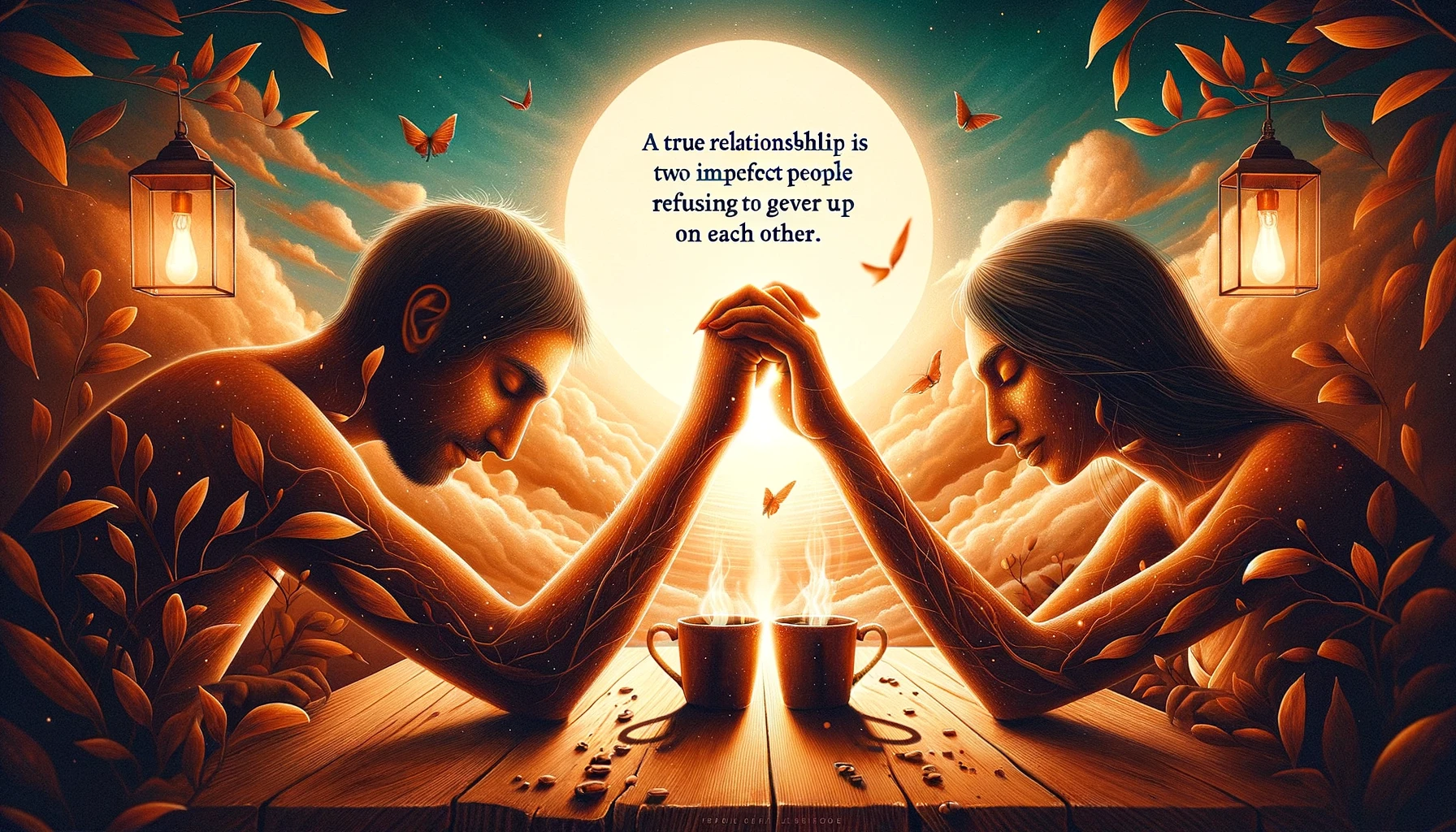
In a world where perfection is often celebrated and sought after, the concept of a “true relationship” seems to defy these societal norms. It’s not about finding someone flawless or waiting for the perfect moment; instead, it’s about two imperfect individuals coming together and choosing, time and again, to not give up on each other. This profound idea captures the essence of what it means to build a genuine connection, a theme eloquently expressed in the phrase, “A true relationship is two imperfect people refusing to give up on each other.” Let’s explore this concept in depth and understand why imperfection can often be the foundation of the strongest bonds.
Embracing Imperfection in Relationships
At the heart of every meaningful relationship is the acceptance of imperfection. No one is perfect, a true relationship is two imperfect people refusi – tymoff and expecting perfection in a relationship is a recipe for disappointment. Imperfections are not flaws to be hidden; they are aspects of each person that add depth and character to their individuality. In a true relationship, partners recognize each other’s imperfections and embrace them, knowing that these quirks and flaws are part of what makes their partner unique.
For instance, one partner might be incredibly organized while the other tends to be a bit chaotic. Instead of seeing this as a point of contention, they can view it as an opportunity for growth and balance. The organized partner learns to be more flexible, while the chaotic partner learns the value of structure. This dynamic not only fosters personal growth but also strengthens the relationship.
The Power of Refusing to Give Up
Refusing to give up on each other is a conscious choice made daily. It’s easy to walk away when things get tough, but true relationships are forged in the fire of adversity. When two people decide to stand by each other through thick and thin, they create a bond that is resilient and enduring.
Every relationship faces challenges, whether they are related to financial struggles, misunderstandings, health issues, or external pressures. The decision to stay and work through these difficulties is what distinguishes a true relationship from a superficial one. It’s about showing up for each other even when it’s inconvenient or uncomfortable.
Communication: The Lifeline of a True Relationship
Effective communication is essential in any relationship, especially when navigating the complexities of imperfection. Open and honest dialogue allows partners to express their feelings, share their concerns, and resolve conflicts. It’s not about winning an argument or proving a point but about understanding and being understood.
In a true relationship, both partners are willing to listen without judgment and speak without fear of rejection. They understand that communication is not just about words; it’s also about body language, tone, and timing. Being mindful of how and when to communicate can prevent misunderstandings and foster a deeper connection.

Forgiveness and Compassion: The Glue That Holds Everything Together
Forgiveness is a cornerstone of any true relationship. Given that both partners are imperfect, mistakes are inevitable. Holding onto grudges or constantly reminding each other of past mistakes only serves to create distance and resentment. Instead, a true relationship is characterized by the ability to forgive and move forward.
Compassion plays a vital role here. When partners approach each other with empathy and understanding, they create a safe space where both feel valued and accepted. This doesn’t mean overlooking serious issues but rather addressing them with kindness and a desire for resolution rather than punishment.
Growing Together Through Challenges
In every relationship, there are moments of doubt and insecurity. These moments can either break a relationship or make it stronger, depending on how they are handled. When two people choose to face challenges together, they learn more about themselves and each other. This shared journey of growth creates a stronger, more intimate connection.
A true relationship is a partnership where both individuals are committed to growing together. This might mean going to therapy, taking time to understand each other’s triggers, or simply being there for each other during tough times. By facing challenges together, partners reinforce their commitment to each other and build a foundation of trust and mutual respect.
The Role of Trust and Respect
Trust and respect are the bedrock of any lasting relationship. Trust is not just about fidelity; it encompasses trusting your partner to be there for you, to support you, and to act in the best interest of the relationship. Respect is about valuing your partner’s opinions, feelings, and individuality.
In a true relationship, both partners trust each other enough to be vulnerable. They respect each other’s boundaries and appreciate each other’s differences. This mutual trust and respect allow them to navigate the ups and downs of life without losing sight of the value they bring to each other’s lives.
Celebrating the Small Moments
A true relationship is not just about grand gestures or life-changing moments. It’s about the small, everyday acts of love and kindness that reinforce the bond between two people. Whether it’s making coffee for your partner in the morning, leaving a sweet note on the fridge, or simply being there to listen after a long day, these small moments add up to create a deep and lasting connection.
Celebrating these moments is crucial. They are reminders of why the relationship matters and the joy that comes from being with someone who understands and appreciates you. In a world that often focuses on the big picture, remembering to cherish these small moments can make all the difference.
The Importance of Individual Growth
While a true relationship is about partnership, it’s also about allowing space for individual growth. Each partner should feel supported in their personal endeavors and encouraged to pursue their passions and interests. This not only contributes to personal fulfillment but also brings new experiences and perspectives into the relationship.
Supporting each other’s growth means recognizing that your partner is an individual with their own dreams and aspirations. It’s about encouraging them to be the best version of themselves, knowing that their growth only enhances the relationship.
The Role of Humor and Joy
Humor and joy are essential components of a true relationship. Life can be challenging, and having a partner who can make you laugh even in tough times is invaluable. Humor helps to lighten the mood, relieve stress, and create a sense of camaraderie.
Finding joy in each other’s company, even in mundane activities, reinforces the connection between partners. Whether it’s watching a favorite show together, dancing in the kitchen, or sharing a funny meme, these moments of joy remind us of the happiness that comes from being with someone who truly understands us.
Building a Legacy of Love
Ultimately, a true relationship is about building a legacy of love. It’s about creating a life together that reflects your shared values, dreams, and experiences. This legacy is not built overnight; it’s the result of countless small decisions to stay, to support, and to love, a true relationship is two imperfect people refusi – tymoff even when it’s difficult.
A true relationship leaves a lasting impact not only on the partners involved but also on those around them. It sets an example of what love can be when two imperfect people refuse to give up on each other.
Conclusion
In a world that often glorifies perfection, a true relationship stands as a testament to the power of imperfection. It’s not about finding someone without flaws but about finding someone whose flaws you can live with, someone who makes you want to be a better person. When two imperfect people choose to refuse to give up on each other, they create a bond that is stronger than any challenge they might face. This is the essence of a true relationship – a commitment to love, growth, and mutual respect that stands the test of time.







